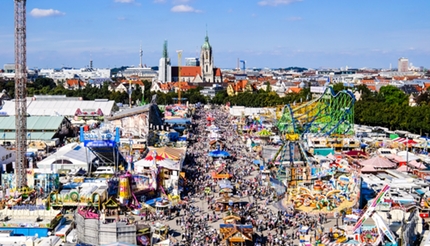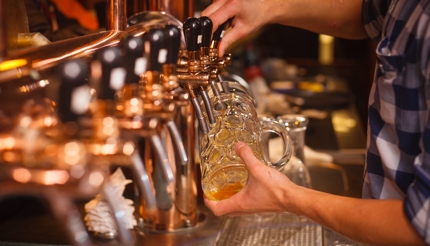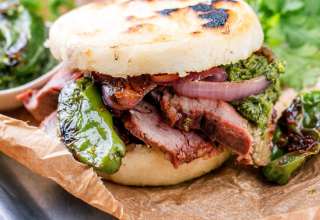Whether you’re an Oktoberfest diehard or have yet to lift your first masskrug, there will come a time when you want to relax. Andrew Eames gets away from it all
Amidst the vast array of food and drink festivals every autumn, mostly celebrating harvest in some shape or form, the biggest has to be Munich’s Oktoberfest, which kicks off on 16 September and runs for 17 days of tipsicated oompah. During that time it will attract six million visitors, some of whom will dress up in leather trousers and sing songs they never knew they knew, aided and abetted by seven million litres of extra-strength beer served in giant masskrugs, 550,000 chickens, 116 oxen and enough salty brezel to put the world in chains.
It is a massive, good-humoured volksfest, and it has spawned siblings across the world, from the United States to Japan. However if you are thinking of going to Munich this year, good luck to you. Any few hotel rooms that remain are ridiculously priced. You may still be able to get into the huge decorated marquees on the Wies’n fairground, but only during the daytime – and until those with reservations boot you out.
But don’t despair, there are several good alternatives for the true beer-fancier which avoid both the crush, and the cost, of the fest.

First things first: the airport brewery
There’s no doubting the refreshment of choice in Munich. As you step off the plane, there it is in the terminal: the Airbräu, the only airport brewery in Europe, complete with gleaming vats and mash tuns. Inside, an appreciative public will be settling down to that essential Bavarian pre-flight pick-me-up: white sausages, brezel and a freshly-brewed half-litre of Mayday, Jetstream or Kumulus, whilst watching the master brewer going about his business. And don’t send the beer back because it is cloudy: the latest trend in Munich is for its ‘liquid bread’ to be unfiltered.
Relax in a beer garden
The concept of the biergarten originated in Munich 200 years ago, when King Maximilian I granted permission to the city’s brewers to sell direct from the cellar door. There was no refrigeration back then, so the brewers stored their stock underground and planted trees (usually horse chestnut) to protect it from the sun. That combination of leafy shade and ready refreshment proved too much of a temptation to customers, so rather than lug the beer home, they settled in under the trees to drink it. The concept of the beer garden was born.
These days the best Munich beer gardens are the huge and informal Hirschgarten, set in a deer park a bit out of the centre, and the higher-profile Seehaus, on a lakeside in the English Garden. Both have year-round buildings, but most of the customers arrive when the leaves first appear on the trees, and fade away again at leaf fall. Seehaus will be swamped during the festival period if the weather is fine, but Hirschgarten’s 8,000 seats can easily absorb any extra interest. And the latter makes a good cost-conscious option, because you can bring your own food here, although various sausages, smoked fish and spare ribs are also available from stalls.
Check out the beer halls
The most famous of Munich’s downtown beer halls is the Hofbräuhaus in Platzl street, and with its 3,000 seats and a brass band from 11am, this is the closest year-round simulation of the Oktoberfest experience, and it’ll be heaving during the festival. Most of the drinkers here will be visitors, but there may be a few watery-eyed lederhosen-wearing diehards who’ll willingly pose for a selfie. Locals prefer Augustiner, a privately-owned Munich brewery (and also a key player in Oktoberfest) which has several stunning old beer halls and a high quality brew which can barely keep pace with local demand, let alone be exported. Their most accessible hall is the Zum Augustiner on Neuhauserstrasse, with its art nouveau interiors and walls covered in antlers. It’ll be busy during the festival, but not as rammed as the Hofbräuhaus.

Visit a micro-brewery
Whilst tradition remains the mainstay of the Munich beer scene, there are also changes afoot, particularly with the introduction of unfiltered (ie cloudy) beer, where the brewing process hasn’t been artificially stopped and the friendly bacteria remain. These beers are not for world domination – they need to be consumed fresh and local, as at the new micro-brewery Giesinger, on Martin-Luther-Strasse south of the Isar river, away from the tourist areas and therefore pretty unscathed by the festival. Giesinger has become something of a focal point for the local community, running a restaurant directly above the brewhouse, and a shop at ground level for customers to replenish their home supplies.
Try the craft beers
Unlike Berlin, where the craft beer scene is well developed, there are only three or four craft beer brewers in this city, but then Munich is a far more conservative society. The most accessible is hipster-friendly Hopfenhacker, based south of the centre in a courtyard off Weissenburgerstrasse in the working class district of Haidhausen, away from any festival frenzy. Here the laid-back crew handmake deliciously fragrant wheat and hoppy beers with catchy names like Handgehopftes and Kill Bill, which can be tasted, and bought, in the yard on Friday evenings and Saturday afternoons.
Stay in a monastery
Bavarian beer culture is not exclusive to Munich, and it can be a great excuse for wider exploration of the surrounding area. A thirty-minute train journey or bus ride south of the city brings you to the Andechs monastery, stunningly located on a little hilltop above Ammersee with a view of the Alps. Here the Benedictine monks still brew the ‘liquid bread’ they started to produce for pilgrims several hundred years ago. The pilgrimage element may have dwindled, but the monastery beergarden has picked up the slack, attracting a million thirsty visitors a year. The brewing process is still overseen by monks, who tend to avoid wearing their habits during the day, because too many visitors ask for selfies. To really get a feel for the place, stay in a guest room (free beer on bedside tables), and experience the monastic peace once the crowds have gone. Rooms cost €40 a night and can be reserved by calling 0049 8152 376 309.






